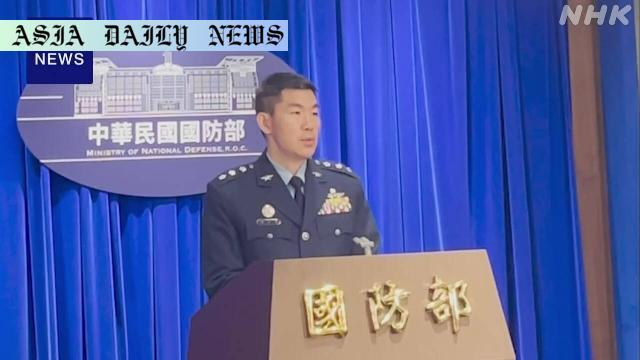Taiwan closely monitors Chinese military activities as the aircraft carrier Liaoning sails near the island’s waters.
- Taiwan is actively monitoring Chinese military presence near its waters.
- Chinese aircraft carrier Liaoning and 31 aircraft sorties spotted in 24 hours.
- Taiwanese President Lai Ching-te emphasizes defense improvements.

Taiwan Faces Heightened Tensions as China’s Carrier Sails Nearby
In a significant development, Taiwan’s defense ministry announced that it is maintaining heightened alertness for the Chinese aircraft carrier Liaoning currently sailing in waters off Taiwan’s southeast coast. This presence aligns with China’s recent history of repeated military drills near Taiwan, underscoring its growing strategic pressure on the island nation. At a press conference on Wednesday, the Taiwanese authorities emphasized their close monitoring of the situation, while remaining tight-lipped about any potential military exercises or counteractivities.
The presence of Chinese naval vessels, aircraft, and surveillance drones in Taiwan’s vicinity is becoming a recurring narrative. Over the course of 24 hours leading to 6 a.m. Wednesday, Taiwan reported the observation of nine Chinese navy ships along with 31 sorties of fighter jets and drones around its airspace. Alarmingly, some of these aircraft ventured into Taiwan’s airspace sectors, including areas in the north, center, southwest, and east. This raises broader concerns about regional stability and escalating tensions in the East Asia Pacific region.
Chinese Activities Highlight a Systematic Military Approach
The active deployment of the Chinese aircraft carrier Liaoning near Taiwan complements a broader military strategy emanating from Beijing. Past exercises have frequently involved carrier operations along Taiwan’s eastern coastline, showcasing China’s intent to project its power. Observers believe such activities are not isolated incidents but part of a calculated attempt to test Taiwan’s defense capabilities and send a geopolitical signal to both Taiwan and its allies, including the United States.
The Taiwanese government has been proactive in recognizing and addressing these developments. President Lai Ching-te, in his speech marking one year in office, highlighted his administration’s commitment to bolstering Taiwan’s defensive infrastructure. His remarks emphasized the seriousness with which Taiwan views Beijing’s growing assertiveness and the associated national security risks. This official stance has garnered widespread public support in Taiwan while also drawing international attention toward the fragile geopolitical balance in the Taiwan Strait.
Geopolitical Implications of Rising Cross-Strait Tensions
The rise in military tensions between Taiwan and China carries profound implications for global international relations. Taiwan, a prosperous yet diplomatically constrained country, sits squarely in the middle of the China-U.S. rivalry, which adds another layer of complexity to the ongoing dispute. The U.S. has often reiterated its support for Taiwan’s defense, with arms sales and naval patrols near the region serving as key examples of its dedication to an open Indo-Pacific strategy.
From a military perspective, keeping Taiwan secure against large-scale provocations remains essential for maintaining stability in East Asia. Failure to deter aggressive maneuvers by China may inadvertently lead to uncontrollable escalations, setting the stage for a long-term conflict. Consequently, analysts stress the importance of a nuanced diplomatic approach that prioritizes de-escalation but also ensures Taiwan remains capable of safeguarding its sovereignty.
While an outright conflict remains unlikely, China’s recurring demonstrations of assertive military activity highlight its strategic ambitions. For Taiwan, retaining an agile and prepared peacekeeping policy while strengthening defensive deterrence will remain integral as the spectrum of potential engagement evolves.



Commentary
China-Taiwan Relations: A Perpetual Balancing Act
The tensions between Taiwan and China are not new, but recent events involving the Chinese aircraft carrier Liaoning amplify the issue in dramatic fashion. China’s calculated show of force sends a potent message, not just to Taiwan, but to the world. Its military presence near Taiwan reaffirms its long-standing claim over the island, which Beijing considers a breakaway province, despite Taiwan functioning as a fully self-governed democracy.
Strategic and Psychological Impact of Military Exercises
For Taiwan, the stakes remain high. Chinese military drills, such as the ones witnessed with the Liaoning carrier, are often seen as attempts to test the waters—both strategically and psychologically. By routinely sending fighter jets into Taiwan’s airspace or deploying navy vessels along its coastline, China is possibly assessing the island’s military response time, preparedness, and capability.
This form of overt pressure is not merely military in nature but political as well. By sustaining such proximity-based posturing, Beijing likely intends to destabilize Taiwan’s sense of security while demonstrating to its international allies, particularly the United States, that it has the upper hand in this arena.
An International Call to Action
This situation demands a strong international response—not necessarily in the form of overt military intervention but clear diplomatic engagement. Ensuring that Taiwan can continue to maintain sustainable self-defense measures while receiving global solidarity will be key in preventing any rapid escalations in the Taiwan Strait. Additionally, a peaceful resolution depends heavily on encouraging restraint on all sides—whether that be through governmental dialogue or third-party mediation.
Ultimately, this ongoing issue in East Asia reminds the world of the fragile balance between sovereignty, power projection, and the ever-changing dynamics of international politics. Whatever the outcome may be, a stable and secure East Asia serves in the best interests of the global community.